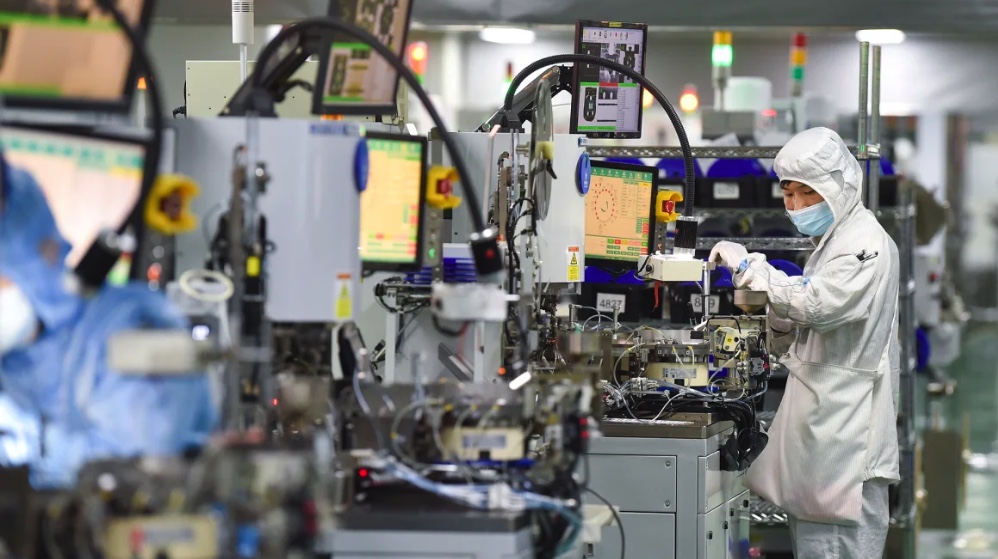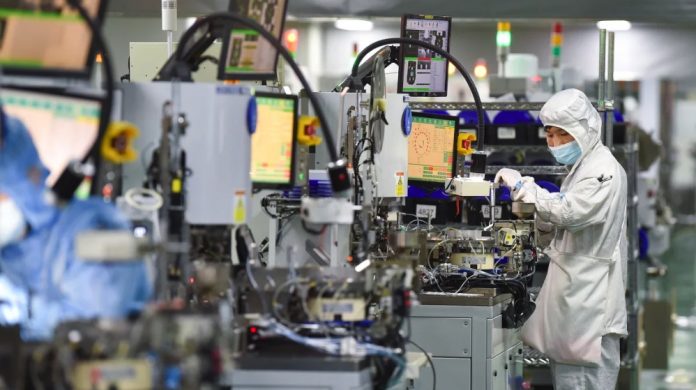จีนกำลังผลักดันการครอบงำเทคโนโลยีขั้นสูงอย่างเข้มข้นด้วยกองทุนเพื่อการลงทุนของรัฐด้านเซมิคอนดักเตอร์ที่ใหญ่ที่สุดเท่าที่เคยมีมา ซึ่งมีมูลค่า 47.5 พันล้านดอลลาร์ ตามข้อมูลของหน่วยงานของรัฐบาล ความเคลื่อนไหวนี้เกิดขึ้นท่ามกลางข้อจำกัดของสหรัฐฯ ในการส่งออกชิป ซึ่งมีจุดมุ่งหมายเพื่อขัดขวางความทะเยอทะยานของปักกิ่ง กองทุนนี้ได้รับการสนับสนุนจากการลงทุนจากธนาคารของรัฐรายใหญ่ เช่น ICBC และ China Construction Bank สะท้อนให้เห็นถึงแรงผลักดันของ สี จิ้นผิง ในการส่งเสริมความกล้าหาญด้านเทคโนโลยีของจีน ปักกิ่งตั้งเป้าเป็นผู้นำระดับโลกในด้าน AI 5G และการประมวลผลควอนตัม ซึ่งสอดคล้องกับโครงการริเริ่ม “Made in China 2025” กองทุนเพื่อการลงทุนอุตสาหกรรมวงจรรวมของจีนที่เพิ่งเปิดตัวใหม่ ซึ่งมีชื่อว่า “กองทุนขนาดใหญ่” ถือเป็นระยะที่สามของความพยายามนี้ ซึ่งเปิดตัวในกรุงปักกิ่งเมื่อวันศุกร์ที่ผ่านมา และมีรายละเอียดอยู่ในระบบประชาสัมพันธ์ข้อมูลเครดิตองค์กรแห่งชาติ
หลังจากการประกาศ ผู้ผลิตชิปชั้นนำของจีนพบว่าราคาหุ้นของตนเพิ่มขึ้น SMIC ซึ่งเป็นผู้ผลิตชิปรายใหญ่อันดับสามของโลก เพิ่มขึ้น 7% ในขณะที่ Hua Hong Semiconductor ซึ่งเป็นโรงหล่อชิปรายใหญ่อันดับสองของจีนและซัพพลายเออร์ของ Huawei เพิ่มขึ้น 13% กองทุนระยะเริ่มแรกซึ่งเปิดตัวในปี 2557 ด้วยมูลค่า 138.7 พันล้านหยวน (19.2 พันล้านดอลลาร์) ตามมาด้วยระยะที่สองด้วยมูลค่า 204.1 พันล้านหยวน (28.2 พันล้านดอลลาร์) การลงทุนเหล่านี้มีเป้าหมายเพื่อยกระดับอุตสาหกรรมเซมิคอนดักเตอร์ของจีนไปสู่มาตรฐานสากลภายในปี 2573 โดยมุ่งเน้นไปที่การผลิตชิป การออกแบบ อุปกรณ์ และวัสดุ
ล่าสุด “กองทุนใหญ่” ประสบปัญหาคอร์รัปชั่น ในปี 2565 กลุ่มเฝ้าระวังต่อต้านการรับสินบนของจีนได้สอบสวนเจ้าหน้าที่ระดับสูงของบริษัทชิปของรัฐ ซึ่งรวมถึงหลู่ จุน อดีตซีอีโอของ Sino IC Capital ซึ่งเป็นผู้จัดการกองทุน ถูกฟ้องในข้อหารับสินบน ความท้าทายเหล่านี้ ประกอบกับการควบคุมการส่งออกชิปขั้นสูงของสหรัฐฯ ขัดขวางความทะเยอทะยานของสีในการพึ่งพาตนเองทางเทคโนโลยี จีนโต้กลับด้วยการควบคุมการส่งออกวัตถุดิบหลักในการผลิตชิป กองทุนชิปใหม่ทำหน้าที่เป็นทั้งการตอบโต้มาตราการลงโทษของชาติตะวันตก และสะท้อนถึงความทะเยอทะยานของสีที่ต้องการวางตำแหน่งจีนให้เป็นผู้นำด้านเทคโนโลยีระดับโลก เมื่อปีที่แล้ว Huawei เปิดตัวสมาร์ทโฟนที่ขับเคลื่อนโดยโปรเซสเซอร์ 7 นาโนเมตรจาก SMIC ผู้เชี่ยวชาญในอุตสาหกรรมที่น่าประหลาดใจ ในการพบปะกับนายกรัฐมนตรีมาร์ก รุตต์ ของเนเธอร์แลนด์เมื่อเดือนมีนาคม สีเน้นย้ำว่า “ไม่มีกำลังใดสามารถขัดขวางความก้าวหน้าทางวิทยาศาสตร์และเทคโนโลยีของจีนได้” เนเธอร์แลนด์เผชิญกับข้อจำกัดในการส่งออกเครื่องจักรพิมพ์หินที่สำคัญไปยังประเทศจีน ตามที่ ASML เปิดเผยในเดือนมกราคม
China is investing an additional $47.5 billion into its chip industry.

China is intensifying its push for dominance in advanced technologies with its largest-ever semiconductor state investment fund, valued at $47.5 billion, according to a government-run agency. This move comes amidst US restrictions on chip exports, aimed at thwarting Beijing’s ambitions. Supported by investments from major state-owned banks like ICBC and China Construction Bank, the fund reflects Xi Jinping’s drive to bolster China’s tech prowess. Aligned with the Made in China 2025 initiative, Beijing aims for global leadership in AI, 5G, and quantum computing. The newly launched China Integrated Circuit Industry Investment Fund, dubbed the “Big Fund,” marks the third phase of this effort, unveiled in Beijing last Friday and detailed in the National Enterprise Credit Information Publicity System.
Following the announcement, top Chinese chip makers saw a boost in their stock prices. SMIC, the world’s third-largest contract chipmaker, rose 7%, while Hua Hong Semiconductor, China’s second-largest chip foundry and a Huawei supplier, surged 13%. The fund’s initial phase, launched in 2014 with 138.7 billion yuan ($19.2 billion), was followed by a second phase with 204.1 billion yuan ($28.2 billion). These investments aim to elevate China’s semiconductor industry to international standards by 2030, focusing on chip manufacturing, design, equipment, and materials.
The “Big Fund” has faced corruption issues recently. In 2022, China’s anti-graft watchdog investigated state-owned chip companies’ top officials, including Lu Jun, former CEO of Sino IC Capital, the fund’s manager, indicted on bribery charges. These challenges, along with US export controls on advanced chips, hinder Xi’s ambition for tech self-reliance. China countered with export controls on key chip making raw materials. The new chip fund serves as both a response to Western sanctions and a reflection of Xi’s ambition to position China as a global tech leader. Last year, Huawei unveiled a smartphone powered by a 7-nanometer processor from SMIC, surprising industry experts. In a meeting with Dutch Prime Minister Mark Rutte in March, Xi emphasised that “no force can impede China’s scientific and technological advancement.” The Netherlands faced restrictions on exporting crucial lithography machines to China, as disclosed by ASML in January.
By CNN NEWS

















